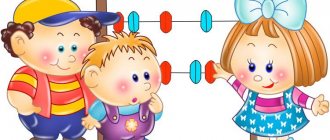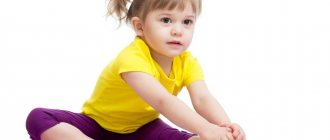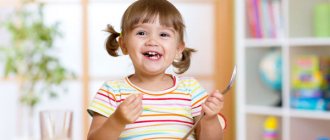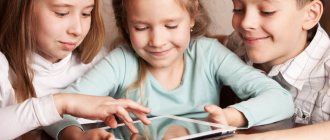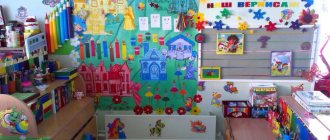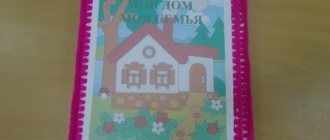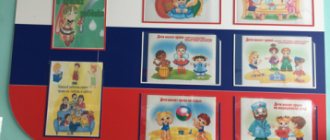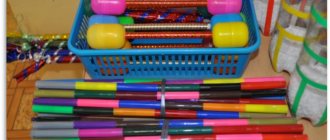Sample topics for self-education for educators
1. Activation of the vocabulary of children of the younger age group.2. The influence of educational activities directly on the play of young children.
3. The influence of oral folk art on the development of speech in children 3-4 years old.
4.Education of preschool children through work.
5. Education of moral qualities of preschool children through Russian folk tales.
6. Gender education of preschool children in a kindergarten.
7. Didactic game as a form of teaching young children.
8. Didactic games in teaching children the basics of mathematics.
9.Spiritual and moral education of preschool children.
10.Spiritual and moral education of children through reading fiction.
11.Game as a means of educational activity in the context of the implementation of the Federal State Educational Standard.
12.Game as a means of communication for preschoolers.
13. Playing activities of children at the stage of transition from early to preschool childhood.
14.Use of health-saving technologies in the first junior (second junior, middle, senior) group.
15.Use of educational games in mathematics classes with children of primary (middle, senior) preschool age.
16.Use of various non-traditional drawing techniques in working with children 2–3 years old.
17. Personality-oriented approach to the education of preschool children.
18.Methods of forming correct posture and preventing its violation in preschoolers.
19. Folk outdoor games in the physical education of preschoolers.
20. Enriching the social experience of preschoolers.
21.Health-improving gymnastics after a nap, its meaning.
22. System of work in preschool educational institutions for patriotic education.
23. Patriotic education of preschool children through the use of fine arts.
25. Outdoor play as a means of developing speed and dexterity in children of junior (middle, senior) preschool age.
26. Cognitive and research activities of preschool children.
27. Traffic rules for preschoolers.
28. Techniques for activating mental activity in the process of introducing children to nature.
29. Project activities with children of primary (middle, senior) preschool age.
30. Project method in the spiritual and moral education of preschool children.
31.Development of dialogical communication between children in a group of different ages (4-7 years).
32. Development of play activities in young children.
33. Development of communication abilities of older preschoolers through communication with nature.
34.Development of mathematical abilities of preschool children through play activities.
35.Development of fine motor skills of preschoolers.
36.Development of fine motor skills in preschool children through non-traditional drawing techniques.
37. Development of cognitive activity of preschool children.
38. Development of search and research activities of preschoolers in the process of experimentation.
39. Development of speech in children of early and primary preschool age.
40. Rhetoric lessons and speech etiquette as a means of developing the speech of preschoolers.
41.Development of sensory abilities of preschool children.
42.Development of sensory abilities through didactic games.
43.Development of children's creative abilities in visual arts.
Development of children's creative abilities using non-traditional drawing techniques.
44.Development of creative abilities of preschoolers through puppet theater.
45. Speech development of preschool children
46. The role of motor mode for the health of preschool children.
47. The role of play in the physical development and promotion of health of a preschooler.
48. The role of riddles in the development of a preschooler.
49. The role of the family in raising preschool children.
50. Fairy tale as a means of spiritual and moral education of preschool children.
51. Modern approaches to the implementation of the tasks of the educational field “Cognitive development”
.- Modern approaches to the implementation of tasks in the educational field “Speech development”
.- Modern approaches to the implementation of tasks in the educational field “Social and communicative development”
Modern approaches to the implementation of tasks in the educational field “Artistic and Aesthetic Development”
52. Theater - as a means of forming coherent speech in preschoolers.
53.Theatrical activities as a means of developing a child’s creative personality.
54. Physical development of children in play activities.
55. Physical education and health work with children.
56. Formation of communicative qualities in children of junior (middle, senior) preschool age.
57.Formation of communicative qualities in children of senior preschool age through communication with nature.
58. Formation of a culture of health in preschool children.
59. Formation of the beginnings of the ecological culture of preschool children.
60.Formation of the foundations of pedagogical skills.
61.Formation of patriotic feelings in preschoolers.
62.Formation of children's speech in play activities.
63. Fiction as a means of comprehensive development of a preschooler.
64. Artistic and speech development of children through joint theatrical activities of children and parents.
65.Environmental education of children in kindergarten.
66. Ecological development of children in the younger (middle, older) age group.
67. Activity approach in the education of preschool children
68. The influence of the developmental teaching method on the formation of the personality of a preschooler
69.Use of multimedia didactic games in the cognitive development of preschool children
Organization of work on self-education of preschool teachers
Organization of work on self-education of preschool teachers.
Only a teacher who has been studying all his life can teach something new, useful and interesting.
Today, society is experiencing the most profound and rapid changes in its history. The old style of life, when one education was enough for a lifetime, is being replaced by a new life standard: “EDUCATION FOR ALL, EDUCATION THROUGHOUT YOUR WHOLE LIFE...”. One of the indicators of a teacher’s professional competence is his ability to self-educate.
Self-education
– this is a specially organized, independent, systematic, cognitive activity aimed at achieving certain personally and (or) socially significant educational goals: satisfying cognitive interests, general cultural and professional needs and improving professional qualifications.
Self-education contributes to the formation of an individual style of professional activity, helps to comprehend the teaching experience and one’s own independent activity.
Science has defined three levels of self-educational activity:
- adaptive;
- problem-search;
- innovative.
Each subsequent level includes the previous one and at the same time is distinguished by qualitative changes.
- The first level,
adaptive ,
is typical for a beginning teacher. His goal is to adapt to the profession. - The second,
problem-search level
is a qualitatively new stage of self-educational activity. It is at this stage that effective working methods and original techniques can be found. - The third,
innovative level
assumes a high degree of development of relevant skills. At this stage, the teacher creates a socially significant product of activity that has practical novelty.
The factor of complete freedom of choice, complete independence leaves a unique imprint on self-education.
This choice is not given to everyone; it requires not only setting a goal, but also work and persistence in its implementation.
The purpose of self-education of a preschool teacher:
- expansion of general pedagogical and psychological knowledge in order to expand and improve teaching and educational methods;
- deepening knowledge using different methods;
- increasing the general cultural level of the teacher;
- mastery of the achievements of pedagogical science, advanced pedagogical practice.
Main directions
in the self-education system of preschool teachers there may be:
- Familiarization with new regulatory documents on issues of preschool education;
- Study of educational and scientific-methodological literature;
- Familiarization with new achievements in pedagogy, child psychology, anatomy, physiology;
- Study of new programs and pedagogical technologies;
- Familiarization with best practices of preschool institutions;
- Raising the general cultural level.
It is possible to assess the development needs of teachers using a questionnaire.
It is desirable that the topic of self-education be related to the problems being solved in the preschool educational institution, with the priority direction of its activities. This allows you to solve two problems:
- The activities of teachers in the process of self-education will contribute to solving the problems of preschool educational institutions;
- Teachers will not need to disperse their efforts, solving separately the problems of preschool educational institutions and the tasks of their own development, they will concentrate on one problem, and all teachers of preschool educational institutions will be able to benefit from the result of this activity in the future.
Topics are also selected taking into account the individual experience and professional skills of the teacher.
The chosen topic of self-education should be close and understandable to the teacher; only in this case the result will be effective and will reveal the teacher’s creative potential.
If a teacher, for some reason, cannot independently formulate a problem or topic of self-education, it is necessary to use a special questionnaire to study his difficulties.
Implementing a differentiated approach in determining the leading areas of professional development of teachers, we can recommend the following topics for self-education according to experience and teaching experience.
For young professionals:
- Awareness of the values of a person-centered model of education, training and development;
- Formation of the foundations of pedagogical skills;
- Development of skills and constructive abilities.
For educators working for over 5 years:
- Mastering the methods of designing the educational process in order to increase its efficiency and quality in the conditions of variable education;
- Formation of the ability to analyze scientific and methodological literature, application of acquired knowledge in practice, activation of creative abilities.
For experienced, creatively working educators:
- Development of abilities to redesign one’s own activities in the context of development trends in psychological and pedagogical science and the social order of society;
- Demonstration of the creative potential of the teacher;
- Promoting your achievements;
- Development of research activities.
For teachers without special education:
- Mastering methods of working with children;
- Adaptation to teaching activities.
It is impossible to teach creativity, but it is possible to encourage teachers to take several steps in their professional development, and methodological services in educational institutions are working on this.
It is necessary to create conditions that will help teachers “get involved” in the process of self-education.
The success of a teacher in professional self-education directly depends on the support and assistance of a senior educator. The teacher needs methodological assistance:
- in defining the topic, goals and objectives;
- in planning work on self-education;
- during the implementation of the plan;
- in studying and analyzing the effectiveness of their work.
The stages and content of self-education activities are presented in the table (ON SLIDE)
Stages of self-education:
1.Select a theme (
includes
):
The teacher determines for himself the topic of self-educational activity, it follows from the professional interest of the teacher, then sets the goal and objectives of self-education, and draws up an individual plan - what and in what time frame needs to be mastered, accomplished, done.
2.Planning work on the topic of self-education
At the beginning of the school year, each teacher develops an individual work plan for the school year in accordance with the chosen topic of self-education. Together with the senior teacher, the forms and timing of the report on this topic are selected.
3.Theoretical study of the problem
During the academic year, the preschool teacher, according to his self-education plan, works on the chosen topic:
- familiarization with the subject of study, accumulation of material;
- studying the necessary scientific and methodological literature;
- study of advanced pedagogical experience;
- participation in GMOs to enrich work experience;
- if necessary, advanced training courses are organized;
- participation in seminars, consultations, making a report on work experience at the pedagogical council;
- maintaining reporting documentation.
4. Practical activities
(application of knowledge, skills and abilities in practice):
- monitoring on a selected topic at the beginning and end of the school year;
- analysis of the conditions necessary for the implementation of the topic being studied;
- development and conduct of educational situations, conversations, holidays and entertainment;
- organizing exhibitions of children's works;
- organization of circle activities;
- implementation of creative projects in a group;
- production of manuals and attributes, card files, etc.;
- creation of a modern subject-development environment in the group;
5. Summing up the results of self-education.
At the end of the school year, the teacher analyzes his activities.
The form of the report can be: presentation of a report, holding open screenings in preschool educational institutions, presentation of the created developmental environment, product of activity, pedagogical developments, publication of articles, summarizing work experience.
The duration of the stages can vary depending on the complexity of the topic, its coverage in the theory and practice of preschool education, and the experience of the teacher himself. The deadline for implementing the plan is determined by the teacher himself, but as a rule, 3 years.
Every activity is meaningless if it does not result in the creation of a certain product, or if there are no achievements.
And in the teacher’s personal self-education plan there must be a list of results that must be achieved within a certain period of time.
What can be the results of self-education?
teacher at some stage of work, because self-education is continuous, but it needs to be planned in stages:
- developed methodological manuals, articles, programs, scripts, studies;
- development of new forms, methods and techniques for teaching and raising children;
- reports, speeches;
- development of didactic materials;
- development of methodological recommendations for the use of new information technology;
- developing and conducting open reviews of GCDs using our own innovative technologies;
- holding seminars, conferences, summarizing experience on the problem under study;
- increasing the prestige of an educational institution.
At the end of work on the topic, the teacher conducts self-analysis
and writes
a report
.
Based on individual plans, a general work plan for self-education of preschool teachers is drawn up.
In the methodological office of the preschool educational institution, exhibitions are created: “We advise you to learn from your colleagues”, “Help in organizing self-education”.
Self-education should not be limited to writing reports and designing colorful folders.
Self-education will give positive results if it is carried out purposefully, systematically and systematically. Thus, it will contribute to the formation of creative activity and increase the professional skills of each preschool teacher.
6
Self-education “Formation of the foundations of pedagogical skills”
********
Self-education “Formation of the foundations of pedagogical skills”
Self-education plan
«Formation of the foundations of pedagogical skills»
“
Master ” (translated from Latin - boss, teacher)
is a person who has achieved a high level of perfection and creativity in his work.
“
Mastery ” (high level of professionalism)
is a complex of personality qualities that ensures a high level of professional
pedagogical activity .
What is teaching skill ? You can address this question to a thousand teachers , and each will give their own definition from the perspective of their own experience.
Mastery in one's creative activity is deeply individual, however, it is possible to identify common components of pedagogical mastery :
— personal qualities of a teacher ;
— professional pedagogical technology .
Components of pedagogical technology :
1. The teacher’s to manage his behavior; mastery of facial expressions, pantomime, emotions, mood; speech techniques.
2. The ability to influence individuals and teams.
One of the main ways to improve the personality of a teacher is self-education - the formation by a person of his personality in accordance with a consciously set goal. Everything in a person can be developed and improved, but in order to awaken “dormant forces”
, you need systematic and constant work on yourself.
This is an important task for any teacher .
Goal: improve your professional level
Tasks:
- increase the general cultural level
— get acquainted with new regulatory documents on issues of preschool education
— study new programs and pedagogical technologies .
Expected result: assessment of pedagogical values , formation of teaching skills , desire to improve the teaching process .
Form of self-education : individual
Report form : report on the topic of self-education .
Work plan for 2016-2017.
Section of the plan Term Form of work Practical outputs
Study of methodological work on the topic September - May - “Professional competence and professionalism of a teacher : pedagogical approach ”
Druzhilov S. A., 2005
— "Man as an object of knowledge"
Ananyeva B. G., 2001
— "Psychology of the profession"
, Zeer E.F., 2003
— «Pedagogical artistry»
, O. S. Budatov, 2001
— "Monitoring and Evaluation"
, N. F. Efreeva, 2012 Assessment, analysis of experience acceptance
Methodological work on self-education September - May - participation in methodological associations at the municipal level
— participation in professional skills competitions Reports , conversation, consultations, analysis.
Work with parents September - May - development of a plan for working with parents for the year
— preparation and holding of the meeting “Children’s health is a common concern”
Work plans, conversations with parents, consultations, recommendations.
Working with children September - May - self-analysis of teaching activities
— search for effective methods of work while working together with a child
— preparation and implementation of the project “Journey into the world of professions”
GCD, games, conversation, quizzes, exhibitions, excursions, leisure, entertainment
Preparatory group. Senior preschool age. Children 6-7 years old
Self-education program “Development of speech of senior preschool age children through play activities” Educator: Kolpakova E.I. 2022 – 2022 academic year d. Goal: to study the ways, methods and techniques of activating the speech of preschool children, to unite the efforts of teachers and...
Self-education of the teacher of the preparatory group “Theatrical activities as a means of developing the speech of preschoolers” Self-education of the teacher of the preparatory group on the topic “Theatrical activities as a means of developing the speech of preschoolers”
Children's whole life is filled with play. Every child wants to play their role. Teach a child to play, take on a role and act, at the same time...
How to choose a topic for self-education?
There are only two main criteria:
- requirement to study the topic from the outside (formulated in regulatory documents, in particular, in the Federal State Educational Standard for Preschool Education);
- the work of the teacher himself (lack of experience and knowledge to resolve a particular pedagogical situation).
Thus, before choosing a topic, you need to familiarize yourself with the regulatory framework for preschool education and analyze your own experience.
According to the Federal State Educational Standard, a preschool child develops in the following areas:
- social and communicative;
- educational;
- speech;
- artistic and aesthetic;
- physical.
